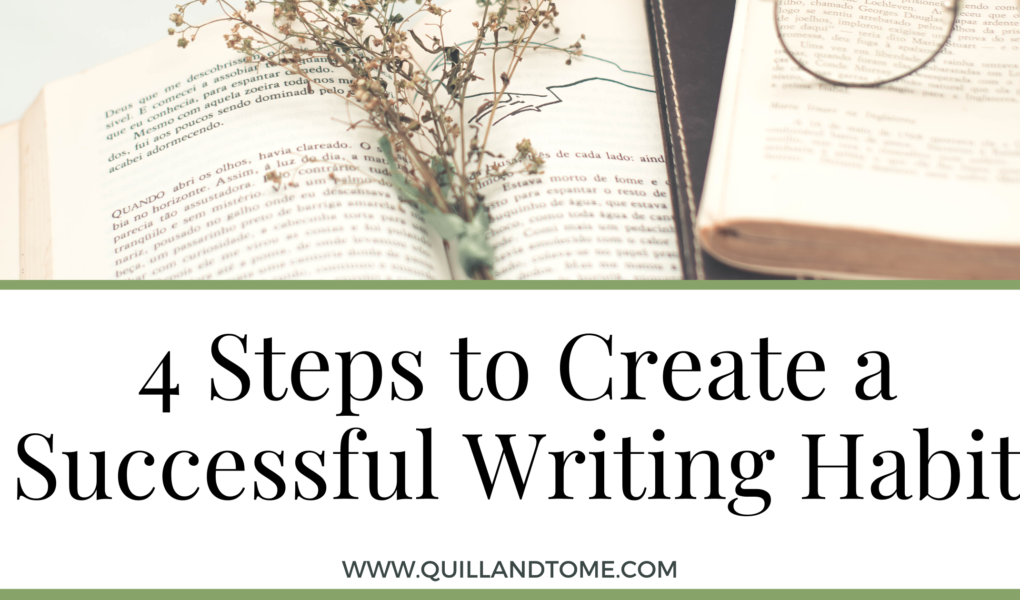Writing is a skill.
Many people might tell you that writing is only for creative people.
You either have the ability to write, or you don’t.
Lucky for us, that is just NOT true.
Anyone can write. It just takes practice and dedication to become a good writer. Just like an athlete. John may have the “talent” of an Olympic high jumper, but if he doesn’t have the passion for it or practice everyday, he will never make it to the Olympics. Joe, however, may not be as naturally “talented” at high jumping, but he is dedicated. He practices everyday and eventually makes it to the Olympics where he wins a Bronze medal.
Writing is the same. It is a skill that you can develop through dedication and practice. You will succeed if you put in the work first. But how do you get there? How do you make the time to write in a day that is already full to the brim? You have to decide what is important to you. If writing is really that important to you, you will be more willing to sacrifice something else in order to reach those goals.
Building a writing routine into your day is essential to succeeding as a writer. It can be fairly simple, but it requires you to be honest with yourself about how you spend your time.
1. Block Your Time
Spend a few days tracking where you spend your time. Be honest with yourself. If you spent 2.5 hours watching Game of Thrones, when you only meant to watch one episode, write it down. Or if you spent 30 minutes scrolling on Facebook when you just sat down to check a message, write it down.
Those are the kinds of time blocks you need to pay attention to so you can create the most productive writing schedule for yourself.
After a few days, take your notes and determine where you are wasting the most time and what you are willing to give up.
For myself, I found that I would spend 30 to 45 minutes on Facebook every morning. Doing essentially NOTHING! By the time I realized how much time had gone by, it was too late. My kids were up, and there went my chance to get any real writing done for the whole day. Bye Bye!
Once I started blocking my time, I became SO much more productive and happy with myself. I don’t even miss those 30 minutes of Facebook!
Now, when I get up in the morning, I allow myself to check my phone for any missed calls or texts, but I refuse to open any social media.
I try to stick to my morning routine by setting the alarm on my phone. Fifteen minutes of exercise, then 20 minutes for a cup of coffee and reading. Then I get dressed and I write. Only then, after I have written for at least 30 minutes do I allow myself to check my social media and email.
Blocking my time like this in the morning has been one of the best things I have done to my writing routine in terms of productivity. My morning block of writing time is done as tech-free as possible where I focus on getting the words onto the page. Later on during the day, I block writing time that I use mainly for research or shorter writing projects that are less affected by interruptions. This block is necessary, since I still want to get some more writing done, but I have my kids at home all day.
Block your time according to the schedule that you already have in place. If you work outside the home, you can block time in the morning before you get ready for work. You can take 30 minutes to an hour after the kids go to bed. If you have a decent-length lunch break, you can even find a quiet spot to sit and write, blocking that time off everyday to meet your writing goals.
2. Spend 10 Minutes Reading
Part of being a good writer is also being a good reader. Don’t look at other authors in your genre as competition. Look at them as your collaborators, your teachers, your cheerleaders, and your team. Everyone has something they can teach you.
In today’s world, the publishing industry is open to everyone, thanks to self-publishing. So, there is now less competition between authors and they more willing to help each other our. TO help you and me out.
Spend at least ten minutes everyday actively reading.
This isn’t the reading you do before bed. I like to read at night before going to sleep, and I often fall asleep doing so. Reading like this is relaxing, but it is not necessarily going to help you become a better writer.
You need to be alert when you read as a writer. You should be able to take notes, either physically or mentally. Ask yourself, how did the author use this scene/character/etc. To develop the story.
To improve your own writing, you should read as a writer for at least ten minutes a day. Read everything you can in your own genre. This will give you an idea of what works and what doesn’t.
You should also read everything you can get your hands on in the genres you don’t write. This will show you what else your readers may be reading. It could also give you inspiration for a subplot in your own story.
For instance, if you are writing an epic fantasy, you should read other epic fantasies to see what kinds of events, characters, or plot points your readers expect. But say you want to add in a romantic subplot. By reading several romance novels, you will learn the plot points readers expect in a romance, like the first kiss and the happily ever after moment.
3. Set a Goal that Speaks to You
When trying to develop the habit of writing everyday, it is important that you establish a realistic and achievable routine.
If you are used to going weeks without writing a single word, start with something small.
It is just like when you start exercising, you do what you can and then build from there. If you try to lift too much weight or run too many miles your first time out, it will be much harder to reach your goal. You may not even reach your goal at all, and then you will feel defeated and want to give up. However, if you start small and just do what you are able, you are more likely to push just a little harder to reach your goals.
Writing is the same. So, if you are used to going weeks without writing a single word, don’t jump into NaNoWriMo and try to write 1,667 words a day. Build up to it.
Start by either giving yourself a word count of about 100 to 200 words a day or a time limit of 10 to 15 minutes. Do nothing but write in that time, Just let the words flow onto the paper.
Don’t stop to do any kind of research. Don’t worry about looking up the spelling of a word. Just write.
Use a daily writing prompt to help get you started if you need it. Get a nice notebook and a good pen before you sit down. You don’t want your train of thought to be interrupted because you need to search for a new pen.
Find a spot that is comfortable, but that allows you to stay alert and has plenty of light. I like to write at my dining room table since there is plenty of natural light and I don’t feel confined to my desk.
Once you are able to meet your goal consistently for a week, then you can increase the word count or time a little. Start off with 100 to 200 words, then maybe move to 400 words. Then 600 to 700 words. Then make it 1,000.
If you work better with a time limit, start with 10 to 15 minutes. Add another 15 and write for 30 minutes. Then 45. Then an hour. If you still have time to write in the midst of your busy day, don’t be afraid to extend that to two to three hours, or more.
Set your goal so you can realistically achieve it. Push yourself just a little. If you think you can only write 200 words, set your goal to 250.
Work to meet your goal and write as much as you can. At the end of the day, if you only wrote 230 words, realize that you conquered the hard part. Do NOT feel defeated. You still sat down and put the words on the page. 230 is still 30 more words than 200. You can always try for 250 again tomorrow.
CHECK OUT THE WRITER’S PLANNER BY QUILL AND TOME!
Get the planner and organize your life and your writing!
What you can find inside:
- Plenty of writing space in a vertical layout
- Undated weekly and monthly pages you can start using any day of the year
- Reading and Writing Trackers
- Writing Tips
- and so much more!
4. Learn the Craft
As you begin writing everyday, you will naturally start to get better at putting words together to craft a story.
However, even the most experienced and successful writers still have things to learn about the craft. Whether that is how to develop a new character or how to build an author platform, there will always be new things to learn.
Read as much as you can about developing your craft. There are so many resources out there that can help you become a better writer.
This blog, for one. We are committed to providing you resources to improve your writing.
DIY MFA by Gabriela Pereira. This book and website are fantastic resources to help you get the education you would receive if you were to get a Master’s degree in Creative Writing.
Facebook groups, like Writing Bad. Groups like this provide a community of writers that are there to help each other. You can share your writing or struggles, and the other members are quick to offer free support, advice, and feedback. Personally, I don’t know where my own writing would be without the Writing Bad and other Facebook groups.
I do not make any kind of money from telling you about these resources. I just fully believe in their messages and stand behind them. They are some of the resources that I turn to personally on a daily basis.
Spend some time finding the resources that you enjoy using. There is so much out there to learn, you will never be able to learn it all. However, you can always strive to improve your current writing abilities.
Learn and hone your writing craft.
Read books, blogs, and articles.
Join Facebook groups.
Find local writing/accountability groups.
Listen to podcasts.
Watch YouTube videos.
Talk to other writers.
Over To You
Hopefully, you found this helpful.
Creating a successful daily writing habit can absolutely be done! Block your time and set realistic goals. Actively read everyday, and build a community around yourself that will support your writing endeavors.
Writing everyday begins with showing up at the same time, same place, and putting the words on the paper. What works for someone else, may not work for you, so you need to find the routine that works for you. Remember, that even if you only write a sentence, you still wrote something. You showed up, you put pen to paper, and that is what makes you a writer.
If you enjoyed this content and are interested in fitting writing into your daily life, DOWNLOAD THE FREE WORKBOOK! Read our monthly newsletter, full of valuable writing advice and be the first to know when we release a new product or book.








Great advice! I recently started blocking off time every day to read and to write and I can already tell it’s made me a stronger writer.
Noelle, that’s fantastic! I resisted for the longest time, but I am so glad that I started, as I am now much more productive.
Great points, Meaghan!! So many of these are things we instinctively *know* we should do, but either resist or just can’t make the habit stick. Small steps add up to big changes! Thanks for sharing. 🙂
Cris, you’re absolutely right! Not every habit will work for everyone. The trick is figuring out how to add the habit into your routine in a way that works for you. Figure out where you have time that you are willing to give up in order to reach your writing goals, and then go from there!